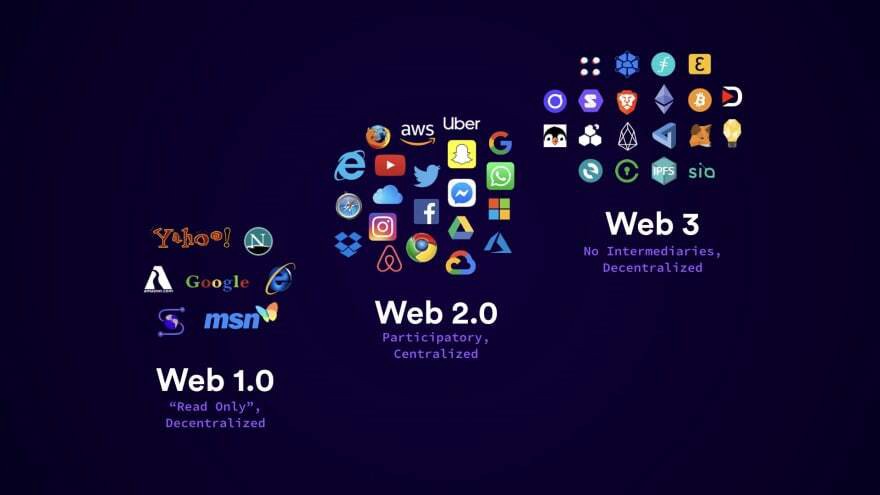Table of Contents
For things that don’t exist yet, web3 certainly excites a lot of people.
The rage is on rising in Silicon Valley these days. . Texprout is fighting for web3 on social media. Investors poured $ 30 billion into startups built on it last year. And smart engineers are quitting difficult jobs at companies like Facebook and joining early.
The mere notion of a new frontier on the Internet has led people to pay millions of dollars for cartoon monkey-themed digital tokens. But so far, web3 is a buzzword intended to be confusing rather than enlightening, causing an identity crisis in the tech industry and affecting others.
What is Web3?
Abbreviation for Web3.0. It may be spelled with an uppercase “W”, but this is usually not the case.
Web 1.0 was the first worldwide web to become popular with web browsers in the 1990s, and Web 2.0 is believed to have followed the rise of mega-platforms such as Google and Facebook 10 years later.

Most references to web3 treat it as a generic term. This is the future vision of the Internet, where ownership and power are more widely shared. This vision is based on a transparent digital ledger known as blockchain (the underlying technology of cryptocurrencies), a more democratic form of the Internet where you, as a user, have a say in important decisions. We envision big tech that competes with governance. How to run the platform.
However, this definition looks quite vague to many. Elon Musk, the world’s wealthiest technician, recently found himself at a loss trying to figure out what web3 is. He said that it’s more of a marketing buzz than a reality.
What’s Wrong with Web2?
In short, many engineers (not to mention many users) are worried that a few tech CEOs have a lot of power. YouTube, Instagram, and Twitter host a lot of content online, including political speeches, and these companies can decide who is banned. We are also accumulating huge amounts of data and expanding our share of Silicon Valley revenue.
It’s a situation where no one is really happy, except perhaps shareholders, and it shouldn’t be.
“We are creating a world where anyone, anywhere may express his or her beliefs, no matter how singular, without fear of being coerced into silence or conformity,” activist John Perry Barlow wrote in his 1996 “Declaration of the Independence of Cyberspace.”
Software developers have been tinkering with alternatives for years. Consider the standardized and open nature of email. However, it is for social media. Services like Mastodon are similar to Twitter, but they don’t have a central server, and they aren’t widespread yet. Twitter is tinkering with its own decentralized social media project called Bluesky.
If web3 hasn’t been proven, why are you optimistic? Optimistic causes are blockchain technology and cipher line development. Bitcoin, Ethereum, and other digital funds are specific examples of all-online, no-one-in-charge invitations, and blockchain-based systems.
And the perceived value of these coins has skyrocketed over the past year, with the market totaling over $ 3 trillion in November, hoping that the decentralized model will apply to other areas of online life as well. I am. If Bitcoin works, you know why. What about other blockchain-based financial products such as insurance and loans?
“Crypto is not only the future of finance but, as with the internet in the early days, is poised to transform all aspects of our lives,” Andreessen Horowitz, a venture capital firm that’s betting big on web3, said last year.
The company defines web3 as “the Internet owned by the creator and the user and tuned with tokens”. And a token in that sense is like a title certificate for a small piece of the internet, whether it’s a video game object or something that might be of value to someone else like art is.
Perhaps all of us will soon own many tokens. The idea goes on as each is different and its value increases over time.
So Do We All Get Rich with Tokens?
That’s what Web3 evangelists say. However, prominent tech founders recently cast cold water on all sermons.
“You don’t own web3,” Twitter and Block co-founder Jack Dorsey tweeted last month. Instead, as always, he said it would belong to the investor class. “It never escapes their incentives. The end result is a centralized entity with different labels.”
Dorsey, who days earlier had been Exhibit A in a Wall Street Journal column about web3 “revolutionaries,” said in a burst of tweets that he had never been a part of web3 and he called for massive investment in free, open-source software. (Dorsey is nevertheless a Bitcoin booster who has said it may help to deliver “world peace.”)
His post upset some people. Andreessen Horowitz’s Marc Andreessen blocked Dorsey on Twitter, causing a minor soap opera in the tech world.
But the early winners of web3 may actually be big companies. The mysterious tokens that people buy and sell as art (including these cartoon monkey tokens) need to be traded in some markets, and one such market, OpenSea, was recently valued at $ 13.3 billion. it was done. (Andreessen Horowitz is an investor in OpenSea.)

Two research firms, Crunchbase and Pitchbook, estimate that many venture capital firms now specialize in crypto investment, spending more than ever on crypto and blockchain startups in the past year. increase.
One of the venture capital firms, named Coinbase Ventures, which is affiliated with the centralized crypto exchange Coinbase, has done around 100 different investments in the previous year. Startups include an Indonesian website for buying cryptocurrencies and an online marketplace for buying video clips from game streamers. Most startups are beginning to explore the business models in general.
Where Does “Web Democracy” Come In?
Do you remember the tokens we all should have in web3? Each of them can have the right to vote.
The best example so far is a group formed in November with the idea of collecting a lot of money to buy a rare copy of the US Constitution at an auction.
The term for this type of group is Decentralized Autonomous Organization (DAO), which is called the constitutional DAO. This unconventional prank failed, but if the group succeeded, they planned to vote for a plan to publish the document. Another recently formed DAO will buy a golf course with voting contributors, such as a country club.
Are People Leaving Big Tech for This?
The appeal of Web3 (money and/or ideal story) is great enough for top engineers to jump out of so-called Web2 companies.
According to CNBC, two top engineers on Facebook’s blockchain and digital currency projects left the company in October to join Andreessen Horowitz’s cryptocurrency team. They quoted the investment company’s track record of “boosting the entire crypto ecosystem.” This is a broader mission than Facebook. And last month, Vice President joined OpenSea from Facebook’s parent company Meta.
It’s not a brain drain, but the pace seems to be rising.
Is This the Future?
The future is always uncertain, but the tech industry is generally at the top, and the topic around crypto is undeniable whether it’s in the bubble or not.
Benedict Evans who is a London-based tech investor said that the crypto world is characterized by irrational and religious hype and “Straumann” attacks. And he said it helped shift the focus of technology away from, for example, smartphones and social media.
“Cryptography is so big and potentially important, but it’s still so vague and fast that we can’t even agree on what to call it,” he said without using the term web3.
There are other hot tech sectors such as games, self-driving cars, and virtual reality, according to Evans, but they could cool Web3 hype in the near future without regulatory intervention from Washington and elsewhere. Is almost nonexistent. For example, other countries, including China, are cracking down on Bitcoin mining. Still, Web3 advocates will find some more up-to-date products useful.
What Will Washington Do?
So far: Mainly discussion. The Biden administration is considering cryptocurrency regulation, and in December Congress held a hearing on potential cryptocurrency regulation and thus all potential tokens for web3.
“What do you say to those who say that this is not a new financial system, but an extension of the old financial system?” Asked Congressman Alexandria Ocasiocortes, DN.Y.
Brian Brooks, one of the witnesses last week, was a former Trump administration official and is now the CEO of the blockchain technology company Bitfury. And other former government officials have been looted by Andreessen Horowitz as part of lobbying to rewrite cryptocurrency regulations.
Andreessen Horowitz also predicts that voters may support candidates for Procrypt. “Web3 has emerged as a major political force,” he said last month, based on a paid survey.
Disclaimer: The opinion expressed here is not investment advice – it is provided for informational purposes only. It does not necessarily reflect the opinion of EGG Finance. Every investment and all trading involves risk, so you should always perform your own research prior to making decisions. We do not recommend investing money you cannot afford to lose.
 English
English Français
Français Español
Español Bahasa Indonesia
Bahasa Indonesia 中文 (中国)
中文 (中国) Русский
Русский Português
Português Deutsch
Deutsch

